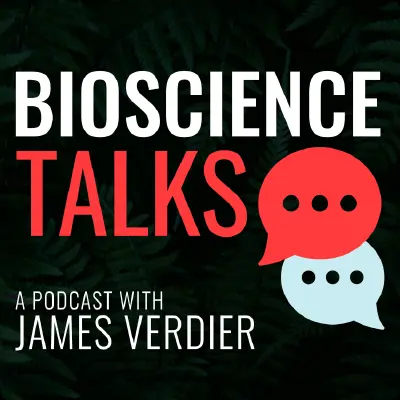
BioScience Talks
163 episodes Last Updated: Nov 25, 24
We hope you enjoy these in-depth discussions of recently published BioScience articles and other science stories. Each episode of our interview series delves into the research behind a highlighted story, giving listeners unique insight into scientists' work.
Episodes
For this episode of BioScience Talks, we're joined by Dr. Kelly Diehl, who has been a veterinarian for almost 40 years and currently works at Morris Animal Foundation, which is one of the largest nonprofits dedicated to animal health research in the world. She was here to talk about the Golden Retriever Lifetime Study and its implications for animal and human medicine. Learn more about the Morris Animal Foundation's important work, including the Golden Retriever Lifetime Study at morrisanimalfoundation.org.
For this episode of BioScience Talks, we're reporting from the 2024 National Diversity in STEM, or NDiSTEM, conference hosted in Phoenix, Arizona, by SACNAS (the Society for the Advancement of Chicanos/Hispanics and Native Americans in Science). Several members of the AIBS team attended, with the aim of helping our member societies and organizations develop an understanding of the ways in which minority-serving societies like SACNAS foster inclusive communities for scientists from traditionally marginalized backgrounds. Attending the conference was extremely rewarding, and we returned with the strong sense that the future of science will be well served by continued efforts to connect and invest in the diverse communities and perspectives representing STEM worldwide. A special thank you to SACNAS for the opportunity and warm welcome. You can visit SACNAS.org to learn more about their programs and events, including the National Diversity in STEM Conference.
For this episode of BioScience Talks, we're joined by Ryan Emanuel, Associate Professor in the Nicholas School of the Environment at Duke University. He joined us to discuss his recent article in BioScience, The Pocosin's Lesson: Translating Respect for Indigenous Knowledge Systems in Environmental Research. In the article, he debunks a widely shared translation of the word "pocosin," and the ways in which researchers—and others—can better engage with Indigenous peoples and their knowledge systems.
Oct 24, 2024
Communicating Truth, with Michael Patrick Lynch
For this episode of BioScience Talks, we're joined by Michael Patrick Lynch, who is the author of the new book On Truth and Politics: Why Democracy Demands It, available for presale from Princeton University Press. He is also the Board of Trustees Distinguished Professor of Philosophy and the Provost Professor of Humanities at the University of Connecticut, and he is the author of other books like Know-It-All Society and The Internet of Us. Our discussion was focused on how scientists can effectively convey truth to a variety of audiences in our current political and technological context, as well as a number of other topics that will be of interest to all scientist–communicators.
For this episode of BioScience Talks, we're joined by Kailiang Yu, from Princeton University, Paolo D'Odorico, from the University of California, Berkeley, and Scott Collins, from the University of New Mexico, who is also former BioScience editor in chief. They discussed their recent article in BioScience on potential expansion of CAM plants in the Anthropocene.
Sep 13, 2024
Flood Ecology, with Paul Humphries
For this episode of BioScience Talks, we're joined by Paul Humphries, Associate Professor in Ecology at Charles Sturt University, in the School of Agricultural, Environmental and Veterinary Sciences. We discussed his recently published article in BioScience, Flood Ecology, and the sometimes uneasy relationship that people have with river floods, as well as some of the ways that we might improve our understanding of them. A version of this conversation can also be found on Dr. Humpries' own podcast, Rheophilia.
For this episode of BioScience Talks, we're joined by Peter Edmunds, Professor of Biology at California State University, Northridge, where he has worked for over 30 years. He was here to discuss his recent article in BioScience's new Perspective and Insight category, entitled "Why keep monitoring coral reefs?". The article describes a now 38-year study of coral reefs in the US Virgin Islands and highlights the value of long-term ecological monitoring.
For this episode of BioScience Talks, we're joined by Mary Hagedorn of the Smithsonian's National Zoo and Conservation Biology Institute for a discussion about biorepositories, and specifically, a plan to place a biorepository on the Moon. Described in a recent article in BioScience, such a repository would take advantage of the Moon's naturally cold temperatures to provide safe long-term storage for cryopreserved animal tissues.
Jul 01, 2024
Soundscape Ecology, with Bryan Pijanowski
Today's episode features Dr. Bryan Pijanowski, Professor of Soundscape Ecology in the Department of Forestry and Natural Resources at Purdue University, in Indiana. He is the author of "Principles of Soundscape Ecology: Discovering Our Sonic World," which was just released and is a definitive guide to the field of soundscape ecology, the topic of today's episode. Dr. Pijanowski is also the author of an influential BioScience article on the field. Learn more about soundscape ecology at the Center for Global Soundscapes, and be sure to check whether the IMAX film discussed in the interview is playing near you.
Today's episode is a mostly onsite podcast from Chattanooga, Tennessee, where BioScience Talks was graciously hosted earlier this spring by the Association of Southeastern Biologists at their annual meeting. Our guests represent a broad range of exciting research and career stages. The meeting was striking in its emphasis on providing a welcoming environment for students. Learn more about ASB here (https://www.sebiologists.org), and be sure to attend a meeting. Our guests included: Amy Allen, Lee High School; Barbara Comer, Georgia Southern University; Skyler Fox, Georgia Southern University; Heather Joesting, Georgia Southern University; Chinyere Knight, Tuskegee University; Howard Neufeld, Appalachian State University; Jeremy Rentsch, Francis Marion University; Jennifer Rhode Ward, University of North Carolina Asheville; and Ashleigh Woods, Wesleyan College.